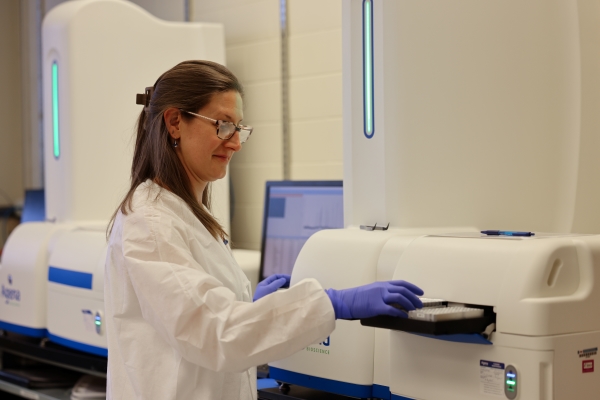National Jewish Health Develops Advanced Molecular Test to Improve Diagnosis of a Genetic Form of COPD
 DENVER - National Jewish Health researchers with the Advanced Diagnostic Laboratories have developed a groundbreaking molecular diagnostic test capable of accurately diagnosing a major genetic cause of chronic obstructive pulmonary disease (COPD) known as Alpha-1 Antitrypsin Deficiency (AATD). The novel 23-SNP alpha-1 antitrypsin (AAT) assay, as described in a recent study published in CHEST Pulmonary, significantly improves the speed and precision of AATD diagnosis by identifying multiple genetic mutations associated with the disease. The test addresses a long-standing challenge in the medical community.
DENVER - National Jewish Health researchers with the Advanced Diagnostic Laboratories have developed a groundbreaking molecular diagnostic test capable of accurately diagnosing a major genetic cause of chronic obstructive pulmonary disease (COPD) known as Alpha-1 Antitrypsin Deficiency (AATD). The novel 23-SNP alpha-1 antitrypsin (AAT) assay, as described in a recent study published in CHEST Pulmonary, significantly improves the speed and precision of AATD diagnosis by identifying multiple genetic mutations associated with the disease. The test addresses a long-standing challenge in the medical community.Both AATD and COPD are conditions that can lead to breathing problems, but they differ in their cause and inheritance. AATD is a genetic condition where the body doesn't produce enough of a protective protein, while COPD is typically caused by long-term exposure to irritants like cigarette smoke. AATD is the second most common genetic lung disease in the United States, behind cystic fibrosis. Severely affecting approximately 1 in 3,000 to 1 in 5,000 individuals, it is estimated to impact about 100,000 Americans, though many more cases are currently undiagnosed.
“AATD is widely underdiagnosed, leading to delays in treatment that can worsen disease outcomes,” said Yongbao Wang, PhD, lead researcher and senior author on the paper. “Our test provides an accurate, comprehensive and rapid genotyping solution that can be implemented as a frontline diagnostic tool.”
The study validated the assay using 373 biological samples, demonstrating its ability to detect 20 pathogenic mutations in the SERPINA1 gene, responsible for AAT protein production, as well as two normal variants and an additional variant that is still being studied. The assay broadens the number of identifiable genotypes from currently available testing, including less common alleles such as F, I and some null alleles. Results showed 100% accuracy in identifying abnormal mutations among AATD-affected patients, significantly outperforming the traditional isoelectric focusing gel method and other molecular tests only detecting S and Z alleles. Researchers believe this test could pave the way for newborn screening programs and at-home collection, further enhancing early detection efforts.
“This is a significant step forward for both clinicians and patients,” said Sharon Kuss-Duerkop, PhD, senior scientist at National Jewish Health. “With quicker and more reliable results, we can diagnose AATD earlier and start appropriate treatments, potentially preventing severe lung and liver complications.”
The 23-SNP AAT assay has been integrated into clinical practice at National Jewish Health since 2022, where it is being used to test patient samples in a routine diagnostic setting. The diagnostic test is now available to clinicians through National Jewish Health Advanced Diagnostic Laboratories.
National Jewish Health is the leading respiratory hospital in the nation delivering excellence in multispecialty care and world class research. Founded in 1899 as a nonprofit hospital, National Jewish Health today is the only facility in the world dedicated exclusively to groundbreaking medical research and treatment of children and adults with respiratory, cardiac, immune and related disorders. Patients and families come to National Jewish Health from around the world to receive cutting-edge, comprehensive, coordinated care. To learn more, visit njhealth.org or the media resources page.
Media Resources
We have many faculty members, from bench scientists to clinicians, who can speak on almost any aspect of respiratory, immune, cardiac and gastrointestinal disease as well as lung cancer and basic immunology.
Media Contacts
Our team is available to arrange interviews, discuss events and story ideas.
- Jessica Berry
303.398.1082 office
303.807.9491 mobile
berryj@njhealth.org - Adam Dormuth
303.398.1002 office
970.222.5034 mobile
dormutha@njhealth.org
